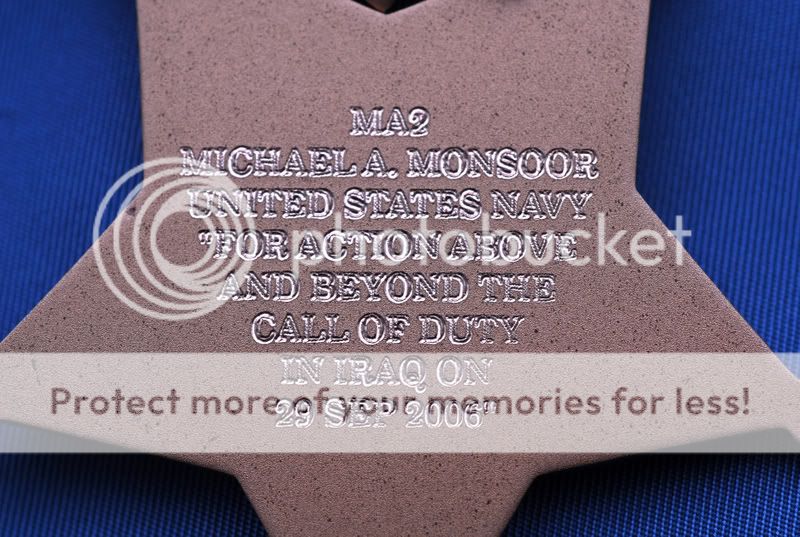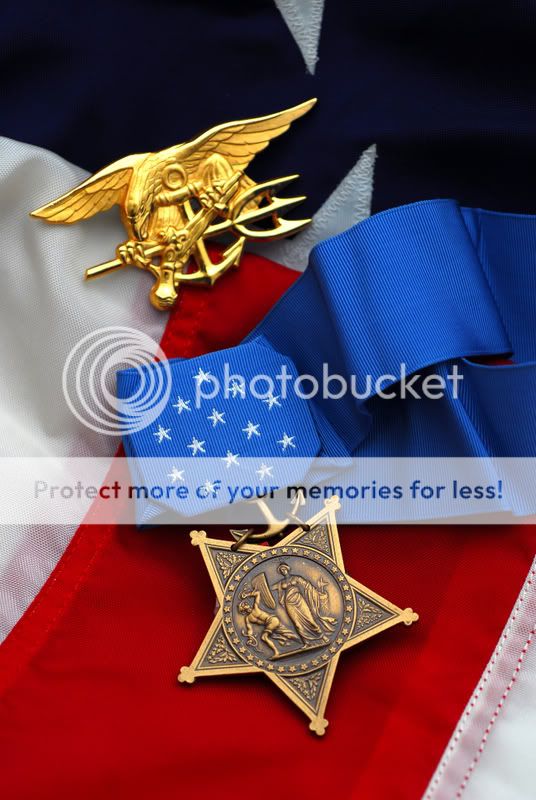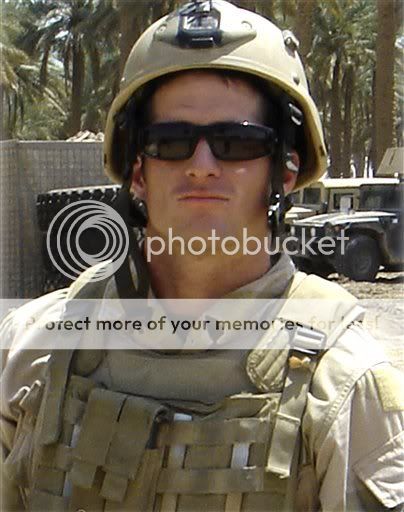http://www.latimes.com/news/local/la-me-moh1apr01,1,6878936.story
Sailor killed in Iraq awarded Medal of Honor

Michael A. Monsoor, who grew up in Garden Grove, has been selected to receive the medal posthumously for his efforts to save fellow SEALs during a firefight in 2006.
On the last day of his life, on a rooftop in Ramadi, Navy SEAL Michael A. Monsoor was assigned to protect three SEAL snipers. When an insurgent's grenade lobbed from the street bounced off Monsoor's chest, he didn't hesitate. He yelled "Grenade!" and pounced on it even though he had a clear path of escape.
He was dead within 30 minutes, but he had saved the lives of three SEALs.
On Monday, the White House announced that Monsoor, 25, who grew up in Garden Grove, has been selected to receive the Medal of Honor, the nation's highest medal for combat bravery, for his actions that violent day, Sept. 29, 2006.
It will be the third Medal of Honor bestowed for bravery in Iraq.
Monsoor's family and his fellow SEALs said Monday that even as they grieve over his death they are not surprised that he sought the safety of others before his own.
Sara Monsoor, a pediatric nurse at Children's Hospital of Orange County, said her brother never mentioned the dangers of his deployment in his e-mails and phone calls home. Still, the family knew he had been assigned to what was the most violent city in Anbar province, the home of the most hard-core elements in the Sunni Arab insurgency.
"We knew things were difficult there and if anything happened, Mike would be the first to jump in and try to make it better," his sister said. His fellow SEALs, she added, "were like his brothers."
Navy Lt. Cmdr. Seth Stone, Monsoor's platoon commander on the mission that cost his life, remembered Monsoor's sense of humor and dedication to duty. "Mike never complained. He always had a smile," Stone said.
He said he knew something had gone tragically wrong on the rooftop that day when he heard the sickening sound of the muffled explosion.
President Bush is set to present the medal to Monsoor's parents, George and Sally Monsoor, at the White House on April 8.
"We're looking at it as a way to celebrate Mike," his sister said of the ceremony.
Monsoor is buried at Ft. Rosecrans National Cemetery in San Diego, across the bay from SEAL headquarters in Coronado.
A petty officer second class, he will be the first in the Navy to receive the Medal of Honor for actions in Iraq.
Only one Marine, Cpl. Jason Dunham, and one Army soldier, Sgt. 1st Class Paul R. Smith, have been awarded the medal for actions in Iraq. SEAL Lt. Michael Murphy received the Medal of Honor for service in Afghanistan. All three awards were posthumous.
Monsoor has also been awarded a Silver Star for rescuing a wounded SEAL during the same deployment. While under continuous fire, he dashed into a street to drag his comrade to safety. He never told his family about his heroism. They learned about it the month before his death, while attending another SEAL's funeral.
Born in Long Beach, Monsoor played football at Garden Grove High School, graduating in 1999. He enjoyed snowboarding, body-boarding and spearfishing, as well as riding his motorcycle and driving his Corvette. His father and one of his brothers were Marines, but he decided to enlist in the Navy in 2001.
The family talks about him constantly, his sister said: "We just try to carry on. We're all totally proud of him."
Monsoor completed the grueling 25-week SEAL training in 2004 on his second try. A broken heel had forced him to drop out on his initial attempt. The dropout rate for many SEAL trainee classes exceeds 50%.
In Ramadi, Monsoor's Delta Platoon, SEAL Team Three, was assigned to mentor Iraqi army troops. In late 2006, insurgents were spread throughout the city and had the support -- either through shared ideology or intimidation -- of many residents.
As a communicator and machine-gunner on patrols, Monsoor carried 100 pounds of gear in temperatures often exceeding 100 degrees. He took a lead position to protect the platoon from frontal assault.
On three-quarters of their patrols, the SEALs drew insurgent fire, Stone said. Some firefights lasted for hours. Over about five months, the platoon killed at least 84 insurgents and detained numerous others.
On Sept. 29, the platoon engaged four insurgents in a firefight. Anticipating further attacks, Monsoor and other SEALs had taken up a rooftop position. Civilians aiding the insurgents blocked off the streets, and a nearby mosque blared out a message for people to rise up against the Americans and the Iraqi soldiers.
Monsoor's duty was to protect three SEAL snipers, two of whom were 15 feet away. His position made him the only SEAL on the rooftop with quick access to an escape route.
But when the grenade hit him and fell onto the roof, he "chose to protect his comrades by the sacrifice of his own life," according to a Navy report.
The two SEAL snipers nearest to Monsoor were injured in the blast. Monsoor was immediately evacuated for medical care, but it was too late.
The SEALs, a tough and close-knit, group, were deeply affected by his death, Stone said.



Sailor killed in Iraq awarded Medal of Honor

Michael A. Monsoor, who grew up in Garden Grove, has been selected to receive the medal posthumously for his efforts to save fellow SEALs during a firefight in 2006.
On the last day of his life, on a rooftop in Ramadi, Navy SEAL Michael A. Monsoor was assigned to protect three SEAL snipers. When an insurgent's grenade lobbed from the street bounced off Monsoor's chest, he didn't hesitate. He yelled "Grenade!" and pounced on it even though he had a clear path of escape.
He was dead within 30 minutes, but he had saved the lives of three SEALs.
On Monday, the White House announced that Monsoor, 25, who grew up in Garden Grove, has been selected to receive the Medal of Honor, the nation's highest medal for combat bravery, for his actions that violent day, Sept. 29, 2006.
It will be the third Medal of Honor bestowed for bravery in Iraq.
Monsoor's family and his fellow SEALs said Monday that even as they grieve over his death they are not surprised that he sought the safety of others before his own.
Sara Monsoor, a pediatric nurse at Children's Hospital of Orange County, said her brother never mentioned the dangers of his deployment in his e-mails and phone calls home. Still, the family knew he had been assigned to what was the most violent city in Anbar province, the home of the most hard-core elements in the Sunni Arab insurgency.
"We knew things were difficult there and if anything happened, Mike would be the first to jump in and try to make it better," his sister said. His fellow SEALs, she added, "were like his brothers."
Navy Lt. Cmdr. Seth Stone, Monsoor's platoon commander on the mission that cost his life, remembered Monsoor's sense of humor and dedication to duty. "Mike never complained. He always had a smile," Stone said.
He said he knew something had gone tragically wrong on the rooftop that day when he heard the sickening sound of the muffled explosion.
President Bush is set to present the medal to Monsoor's parents, George and Sally Monsoor, at the White House on April 8.
"We're looking at it as a way to celebrate Mike," his sister said of the ceremony.
Monsoor is buried at Ft. Rosecrans National Cemetery in San Diego, across the bay from SEAL headquarters in Coronado.
A petty officer second class, he will be the first in the Navy to receive the Medal of Honor for actions in Iraq.
Only one Marine, Cpl. Jason Dunham, and one Army soldier, Sgt. 1st Class Paul R. Smith, have been awarded the medal for actions in Iraq. SEAL Lt. Michael Murphy received the Medal of Honor for service in Afghanistan. All three awards were posthumous.
Monsoor has also been awarded a Silver Star for rescuing a wounded SEAL during the same deployment. While under continuous fire, he dashed into a street to drag his comrade to safety. He never told his family about his heroism. They learned about it the month before his death, while attending another SEAL's funeral.
Born in Long Beach, Monsoor played football at Garden Grove High School, graduating in 1999. He enjoyed snowboarding, body-boarding and spearfishing, as well as riding his motorcycle and driving his Corvette. His father and one of his brothers were Marines, but he decided to enlist in the Navy in 2001.
The family talks about him constantly, his sister said: "We just try to carry on. We're all totally proud of him."
Monsoor completed the grueling 25-week SEAL training in 2004 on his second try. A broken heel had forced him to drop out on his initial attempt. The dropout rate for many SEAL trainee classes exceeds 50%.
In Ramadi, Monsoor's Delta Platoon, SEAL Team Three, was assigned to mentor Iraqi army troops. In late 2006, insurgents were spread throughout the city and had the support -- either through shared ideology or intimidation -- of many residents.
As a communicator and machine-gunner on patrols, Monsoor carried 100 pounds of gear in temperatures often exceeding 100 degrees. He took a lead position to protect the platoon from frontal assault.
On three-quarters of their patrols, the SEALs drew insurgent fire, Stone said. Some firefights lasted for hours. Over about five months, the platoon killed at least 84 insurgents and detained numerous others.
On Sept. 29, the platoon engaged four insurgents in a firefight. Anticipating further attacks, Monsoor and other SEALs had taken up a rooftop position. Civilians aiding the insurgents blocked off the streets, and a nearby mosque blared out a message for people to rise up against the Americans and the Iraqi soldiers.
Monsoor's duty was to protect three SEAL snipers, two of whom were 15 feet away. His position made him the only SEAL on the rooftop with quick access to an escape route.
But when the grenade hit him and fell onto the roof, he "chose to protect his comrades by the sacrifice of his own life," according to a Navy report.
The two SEAL snipers nearest to Monsoor were injured in the blast. Monsoor was immediately evacuated for medical care, but it was too late.
The SEALs, a tough and close-knit, group, were deeply affected by his death, Stone said.

Pentagon, Washington, D.C. (March 14, 2008) – Actual Medal of Honor prepared for presentation posthumously to Master-At-Arms 2nd Class (SEAL) Michael A. Monsoor who sacrificed himself to save his teammates during combat operations in Iraq, Sept. 29, 2006. Medal is pictured with the Navy Special Warfare (SEAL) Trident. The parents of Master-At-Arms 2nd Class (SEAL) Michael A. Monsoor will accept the nation's highest military honor on behalf of their son during a White House ceremony April 8, 2008. Monsoor is the first Navy SEAL to earn the Medal of Honor for actions in Iraq and the second Navy SEAL to receive the award since Sept. 11, 2001. Monsoor is the fifth armed forces service member to receive the Medal of Honor since the beginning of Operations Enduring Freedom and Iraqi Freedom. U.S. Navy photo by Mr. Oscar Sosa (Released)

This photo supplied by the U.S.Navy shows the Medal of Honor that was prepared for presentation posthumously to Petty Officer 2nd Class Michael A. Monsoor who sacrificed himself to save his teammates during combat operations in Iraq, Sept. 29, 2006. Medal is pictured with the Navy Special Warfare (SEAL) Trident. Monsoor's parents will accept the nation's highest military honor on behalf of their son during a White House ceremony April 8, 2008

This undated photo released by the United States Navy shows Petty Officer 2nd Class Michael A. Monsoor posing for a photo in Ramadi, Iraq. The elite Navy SEAL who threw himself on top of a grenade in Iraq to save his comrades will be posthumously awarded the highest U.S. military tribute, the Medal of Honor, a presidential press secretary announced Monday, March 31, 2008





